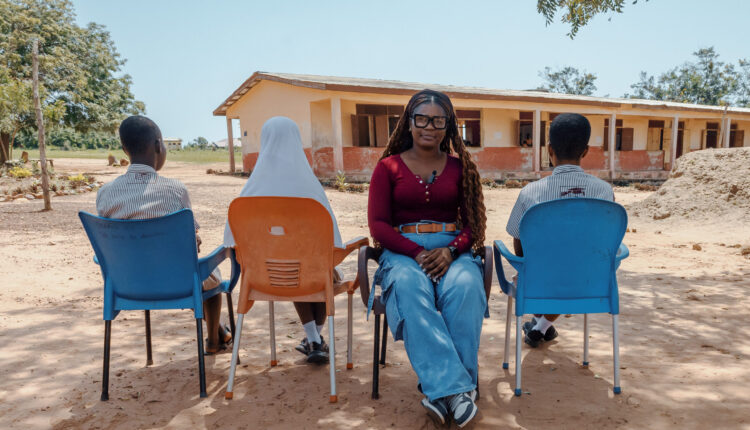In the heart of Bonsuoku, a small town in the Awutu Senya West District of Ghana’s Central Region, the struggle of young girls with menstruation and how to manage it expose a deep-seated problem.
The past few months have been hard on Emmanuella, a 13-year-old junior high school student of the Rev Dr Errikson District Assembly Basic School in the area, who cannot afford to buy what she needs when she’s on her period.
“The first time I saw my blood was last year when I was 12 years old. I was in the house and my mother told me to use her cloth. When I came to school, my friend told me my dress is spoiled, so I felt shy and went home. And since then that is what I have been using.”
Each month, as her period arrives, Emmanuella faces the same, grim reality: she has no access to proper sanitary products. She resorts to using dirty rags, a practice that not only puts her health at risk but also makes her feel ashamed and uncomfortable in school. “I can’t concentrate when I’m worried about leaking or smelling bad,” she says, eyes downcast.
Whatever you think of period poverty, the truth is hard to swallow.
Emmanuella’s situation is not unique; many girls in her community are forced to choose between their education and their menstrual health.
This silent crisis is infringing on many girls’ right to education, forcing them to make difficult choices which often compromise their health, dignity and future. Period poverty is a multifaceted challenge that extends beyond a lack of sanitary products. It is intertwined with cultural stigmas, financial hardship and inadequate education on menstrual health. In Bonsuoku, many families struggle to make ends meet and, for some, buying sanitary pads is a luxury.
Blessing, a 15-year-old in JHS3, grapples with her own challenges. Unlike Emmanuella, she has found a way to buy sanitary pads – by accepting money from male friends. “Sometimes, they expect something in return,” she admits, a hint of worry in her voice. Blessing is acutely aware of the risks she faces, but the need for basics often outweighs her concerns. “I just want to be able to go to school without worrying about my period,” shesays.
The pressure to trade her dignity for financial support is a harsh reality that many girls in Bonsuoku face.
Then there’s Habiba, a 12-year-old in JHS1 who faces a different dilemma. Often when her period comes, she skips school to help her mother on the farm. “I feel guilty about missing classes, but my mother needs me,” Habiba explains.
The burden of household responsibilities even when she is menstruating is such that education takes a backseat, perpetuating the cycle of poverty and limited opportunities. Habiba dreams of becoming a doctor, but each day of school missed pushes that dream further away.
Seeking solutions
In Ghana, period poverty is exacerbated by some of the highest taxation rates on menstrual hygiene products in the world. The Ghana Revenue Authority classifies female sanitary products as finished goods, otherwise known as final consumer goods, subjecting them to a 20% import tax plus a 15% value added tax.
Research shows that the average minimum wage for women in Ghana is about $26 a month, while period products can cost between $3 and $7 for just eight pads. This means that out of every GHC80 earned, GHC11 is spent solely on menstrual products. This calculation does not consider the number of family members these women need to support with essentials such as water, food and clothing. And families often have more than one member who menstruates, compounding the financial burden, as the 80:11 ratio applies to each menstruating individual.
Nenyi Kweku Kwei VI, the chief of Bonsuoku, also expressed anxiety about how hard it is for parents to pay for these necessary products for their daughters.
“Every parent wants the best for their children – especially their daughters, because they are more vulnerable than the males. The issue is, the parents want to help but they don’t have the funds and the jobs to buy these things for their children, so it’s not like they are just ideal; they want to help but they don’t have the means.”
Organisations and local advocates, such as the founder of Amazing Girls Enterprise, Isabella Akwaboah, are working to counter period poverty in the Central Region, providing education on menstrual health and distributing sanitary products.
However, the demand far exceeds the supply. “We need more awareness and support from the community and government,” Akwaboah says. “Every girl deserves the right to manage her period with dignity and continue her education without fear.”
The stories of Emmanuella, Habiba and Blessing are a call to action. As they navigate their teenage years, their experiences highlight the urgent need for solutions to period poverty. By addressing this problem, we can help ensure that girls in Bonsuoku – and beyond – are empowered to pursue their education and dreams without the barriers imposed by natural biological processes.
In a world where education is a fundamental right, no girl should have to choose between her health and her future. It is time to break the silence surrounding period poverty and advocate for the needs of girls such as Emmanuella, Habiba and Blessing so that they can thrive at school and throughout life.
This reporting was completed with the support of the Centre for Journalism Innovation and Development In partnership with the Institute for War and Peace Reporting


Comments are closed.